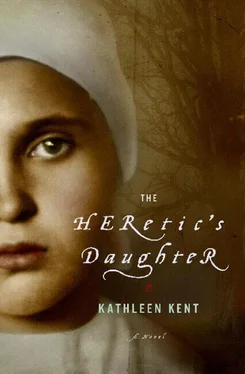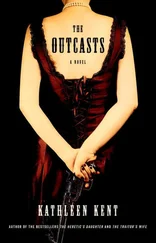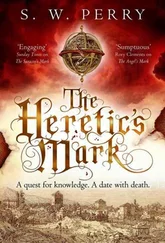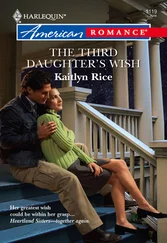Mother looked away as one would do coming upon a naked stranger and waited until I had tucked my despair behind my anger again. Then she said strongly, “Loyalty to your family must come first. Loyalty always to your family.” She stared at the mists burning themselves off the swampy bogs to the south and spoke softly. “You will be ten years of age come November and are leaving the age of childhood for womanhood. But it is not as easy as stepping over a threshold. It is more like traveling a long corridor. I had hoped today you and I could… come to a place of understanding. Still you and I stand at odds. So be it. But there is one thing I must tell you. Something that is painful.”
Her words had taken an interesting turn, and I hoped to be initiated into a deeper understanding of the bit of business that had come close to making Mercy a shamed woman. She had chosen the time and the place well, for I knew that a mushroom was often likened to a man’s root. I had seen such a root on my brothers and was unimpressed. Tom and Richard were too modest to reveal themselves willingly to me, but tight quarters make for revelations. Andrew had lost his modesty along with his wits and so he did not try to hide himself when he made water in the fields or behind the barn. Upon observing the poor, pale thing, I could not imagine such an organ could bring much pain at all to a woman or hold much interest beyond its ability to provide the spark for growing a babe in her belly.
But what she said, to my great disappointment, was “Life is not what you have or what you can keep. It is what you can bear to lose. You may have no choice but to give her up.”
“No.” I stood up, the tendons in my legs cracking with the tension of wanting to escape her insistent harping. I blinked a few times, waiting for her to continue, but she had fallen silent. The sun shone full on her face, and I could not mistake the look she gave me. More cruel than anger, more terrible than pride, more painful even than regret, it was the look of pity. Without another word she rose to her feet, put on her cap, and started walking. The sun had slipped behind a bank of rolling clouds and the air suddenly chilled and moved the grasses about.
I saw at my feet a lone birdfoot violet quivering in the wind. The violet was a spring flower but would sometimes, if the days were kind, bloom again in the autumn. Soon the flower would wither and die alone in the coming frost, its beauty disappearing under the first snowfall. I hurried after her, not wanting to be left behind so close to the swamp. The next time I would see Gibbet Plain with my mother would be under the dark of a new moon, and the surrounding earth would be in the full bloom of spring. The day would be a Monday, May 30th, 1692, and the trout lily, nodding and speckled, would be growing in the forests, and the stargrass, with their winsome yellow blossoms, would be growing on the great meadow. But the day-blooming bloodroot flower, one of my mother’s favorites for its beauty and healing powers, would be shut up tight, as though it feared to hear my mother’s secrets.
NOVEMBER BLUSTERED IN, wet and full of gloom. The days had been too warm to force the leaves to brilliant color, and so the world turned to gray. The weather became cool enough for Father to build a large smoking pit to cure the game he had killed. A long trench was dug in the ground for cold storage of late autumn apples and wild berries. Straw would line the pit, then a layer of apples, then more straw, and finally dirt to cover it. Andrew had been charged with planting markers so that when it snowed, the fruit could be easily found. With great care he stuck in a dozen or so crosses until Mother made him replace them all with simple pikes, as she said it made the mound of dirt look like the aftermath of some bloody battle. Andrew cried and carried on, confusing the fruit buried under the dirt with a buried corpse. He had counted and recounted all of us, certain that one of his family was dead until we gently reminded him to count himself, giving him the comforting number of seven living souls. The yearling hog that Mother had bartered for had grown fat and was slaughtered without too much complaining on his part. Indeed, at first I was sorry to watch him butchered, as he had been docile and showed himself to be clever by coming to us when called to be fed. But if truth be told, my mouth watered when I thought of a portion of his fat little hindquarters finding its way to my mouth.
Robert Russell was to come and share with us a meal to honor the end of the autumn fieldwork and the hopeful beginning of a winter without want. He was to bring with him his niece, Elizabeth Sessions. In the ancient manner of things, he had helped us through the plowing and harvesting, and Father had in turn helped Robert with his. It was then that I learned of Richard’s inclinations after he returned one afternoon to the house, dripping water from his hair and skin like a dog from a dousing. When I asked him if he had fallen into the Shawshin, he scowled and told me to go away. Tom whispered that Richard had actually bathed himself, stripping off his shirt and breeches and jumping into the river wearing only his short hose. This was potent ammunition for teasing him about his affections for Elizabeth and worth the bruises I received on both arms.
On the morning of the feast day Mother sent us all from the house so she could sweep and scrub the dirt from the floor. Tom had fashioned a bow out of pine bough and catgut, the arrows from stripling hardwood, and feathers from an eider duck. We hid behind the barn, not because his bow was forbidden but because the bow’s objects surely would be. He had mastered the primitive targets we had drawn on a wooden plank and all of the smaller animals had long since found a nesting place underground. What was left for us to practice on came in the persons of Hannah and Andrew, who would wear on their heads a kind of straw tower, tall enough to draw the aim of the arrow away from the top wearer’s head. I counseled Tom to imagine the tower as the neck of a deer raising its head to test the wind. A well-placed arrow in the neck could bring down a buck of any size better than a wound at the ribs or rump. We quickly discounted Hannah as she could not hold herself quiet and kept stooping down or moving away from her place, toppling the tower to the ground. Andrew proved much more cooperative and even willing to stand very still and straight, patiently waiting for Tom to take aim. Tom nocked his arrow and pulled back a bit, saying to Andrew, “Now for pity’s sake, don’t dare move ’til after I have hit the target or you’ll be wearing that tower for all eternity.”
At that moment Mother called for us to come back to the house, and I think Andrew would be standing there even now had I not taken his hand and told him it was time to go in. In the kitchen Mother gave me a bucket and bid me go to Chandler’s Inn for small beer. She tied a few precious coins in a little bag and knotted it tight to my apron. William Chandler would take barter for his room and board but not for his spirits. He had to pay coin to the shipper in Boston and so demanded payment in kind at his door. Most times it was Father who went to the inn for the beer, but he had left before dawn to check his traps at the river, and if we were fortunate, we would have fried beaver tails with pork for our supper.
As I walked the short distance down the main road to the inn, I remembered hearing Richard say to Father that in Boston, there was a new drink from the Caribee sold in the taverns to sailors who made port there. It was called “rum” and was wickedly stronger than beer. Father then told Richard that the surest way to awaken on a ship far out to sea was to drink this rum until you were made senseless, easy pickings for the impress men. I matched my steps to the little marching tempo I sang, “rum, rum, rum, rum… rum, rum, rum, rum.”
Читать дальше












